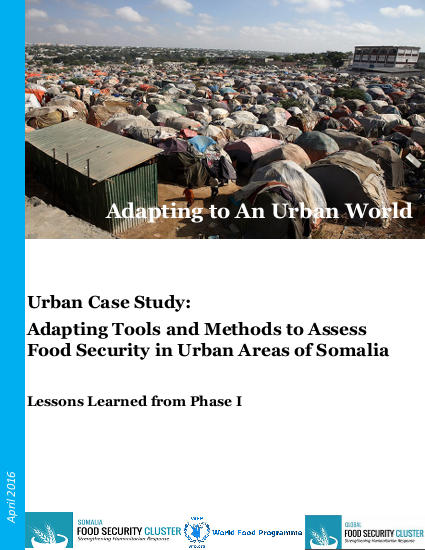Lessons Learned from Phase I

The need to address acute food and livelihoods insecurity among the growing urban population in Somalia has been recognized by humanitarian actors in recent years like elsewhere in similar context. The increasing food insecurity related assessments and programming in urban setting in Somalia is one of the indication of such recognition hitherto limited as compared to rural areas.
The predominantly rural-focused humanitarian actors in Somalia, however was not equipped in addressing the growing and complex food security need of urban population in Somalia particularly in face of recurring disasters / risks /shocks. Most of tools and approaches used in assessing food in security, targeting and delivery of aid have been predominantly based on rural frameworks. Hence, the actors are grappling with wide range of challenges to assess, target and respond to the need of the affected population in urban setting in Somalia. This challenge is not the unique to Somalia and humanitarian actors operational in many protracted and transitional countries facing similar challenges.
The Somalia food security cluster in collaboration with its partners in Somalia has rolled out an initiative of adapting food security assessment tools and methodology to address this challenge partly. The initiative was envisioned to make food security related responses appropriate and effective in urban setting in Somalia subsequently. The initiative was supported by the project “Adapting to an Urban World, co-led by the global Food Security Cluster and the World Food Programme Vulnerability Analysis and Mapping (VAM).
The FSC with the support of an independent consultant has completed the first phase of the initiative. The consultant has made extensive desk review and consultation of the actors to adapt the tools and methodology for assessing urban food insecurity in Somalia. The draft tools prepared based on the initial steps was further reviewed and improved based on the input from partners before piloting in Mogadishu urban setting. The consultant also presented the key lessons and challenges based on the field testing exercise and incorporated in the report and revised tools.
This initiative is still the work in progress given the remaining phases. However key lessons learned and recommendation related technical, operational and methodological issue in assessing urban food insecurity in Somalia presented in this report. The adapted tools also attached in the annex. Key steps and ways forward in terms of refining the proposed tools and institutionalization was also highlighted in the report which will inform the subsequent phase of the initiative
Resource collections
- Evaluating humanitarian action
- Monitoring of humanitarian action
- Somalia humanitarian response
- Topics
- UN Habitat - Urban Response Collection
- Urban Response - Urban Crisis Preparedness and Risk Reduction
- Urban Response Collection - Community Engagement and Social Cohesion
- Urban Response Collection - Economic Recovery
- Urban Response Collection - Environment and Climate Change
- Urban Response Collection - Housing, Land and Property
- Urban Response Collection - Urban Crisis Response, Recovery and Reconstruction
- Urban Response Collection - Urban Resilience
